Saffron Spice
Quick Notes:
What is Saffron Spice?
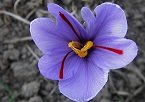 Crocus Sativus - 3 Saffron Stigmas, yellow Stamen
Crocus Sativus - 3 Saffron Stigmas, yellow StamenWhole Saffron spice is a thread/filament called a stigma. Stigmas are the female parts of a plant. Saffron spice stigmas come from a fall crocus (sativus).
It takes one acre of land and about 75,000 flowers (225,000 stigmas) to get one pound of Saffron. Harvesting is done from late October to early November (1-2 weeks). The flowers open at dawn and must be picked by mid-morning before they wither and the stigmas start to lose their color and aroma.
Each plant yields three stigmas which are red in color. They sit atop the plant’s style which is a slim yellowish color stem. Sometimes, pieces of the style may be the source of the non-red materials found amongst your red saffron threads.
Stigmas are hand-picked, therefore harvesting saffron is labor-intensive which factors into the final price making it the world’s most expensive spice by weight. However, a few threads go a long way.
In recipes use about 3 threads of Saffron per person. A ½ gram of Saffron has about 230 threads which would serve roughly 75 people. If you can taste the Saffron in a dish then you may have used too much. Using Saffron in a recipe is more about the aroma than being able to taste it.
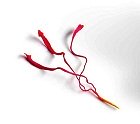 Saffron Stigmas joined together at Style
Saffron Stigmas joined together at StyleSaffron Grades:
Saffron is graded by the International Standard Organization (ISO) 3632 which grades:
Color (crocin)
Flavor (picrocrocin)
Aroma - (safranal)
Grade I = >190 (deep red, aroma is pungent and floral; taste is warm and bitter)
Grade II = >150
Grade III = >110
Grade IV = <110 (less than 110)
Top grade Saffron like Kashmiri or Sargol (Persian) is deep red in color, dry to the touch, strong aroma, and stigmas are between 3/8 and 1/2 inch long.
Spanish Grades: Coupe, Superior, La Mancha, Rio
Coupe (cut) - Grade I, top of the line
Superior - few yellow style tips included
La Mancha - many yellow style tips included
Rio - primarily yellow style tips
Persian Grades: Sargol, Poushal, Bunch, White, Konch
Sargol - Grade I, top of the line, all red stigmas-no style, deep red, dry to the touch
Poushal - red stigmas with some yellow style attached
Bunch - all 3 stigmas still attached to the style and sold in a bunch
White - mostly the pale red/orange parts of the stigmas
Konch - all pale parts of the stigmas with some yellow style
Pictures of Saffron Spice:
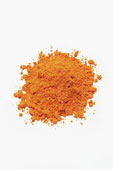 Questionable Ground Saffron - may be cut with Turmeric
Questionable Ground Saffron - may be cut with Turmeric Spanish Superior Saffron - Grade II
Spanish Superior Saffron - Grade II Spanish Saffron Coupe - top Grade I
Spanish Saffron Coupe - top Grade I Kashmiri Saffron - top Grade I
Kashmiri Saffron - top Grade IOrigin of Saffron Spice:
Saffron spice is indigenous to the Middle East, Mediterranean Region (Italy, Spain), North Africa, Kashmir (region between India, Pakistan and China); and Iran (Persian Saffron) which is the world's largest producer by volume.
Ground Saffron spice is sold sometimes in an adulterated manner (mixed with other spices such as Turmeric). Buy from reputable merchants and spice companies. Real Saffron threads (filaments) have a trumpet-like head and a thin tendril-type tail.
Saffron Spice is Good for These Foods:
Saffron spice is good for foods like: beans, breads, chicken, corn, cucumbers, fish, pasta, rice dishes (Risotto Milanese, paella), seafood, soups like a Bouillabaisse, stews, and turkey.
Return to WikiSpices.com Home Page from Saffron Spice
Return to List of Spices - Herbs from Saffron Spice
Add Something About This Spice/Herb
Share something you know about this spice/herb. Or, share a favorite recipe using this spice.
Sign up for eZine
Spotlight On Spices!
See Back Issues
Spice Trivia
Do you know these fun facts about spices and herbs?
Black Pepper is the most popular spice in the world
Cumin is the second most popular spice in the world
By weight, Saffron is the most expensive spice in the world.
Vanilla Bean and Cardamom are expensive spices too. Both are hand-harvested and require much manual labor.
Nutmeg is not a nut. It is the seed/pit of a fruit.
The outer lacy covering (aril) on Nutmeg is called mace blade. When in the ground powder form, it is just called "mace"
Cilantro and Coriander are from the same plant. Cilantro is the leaf, and coriander is the seed.
There are almost one million seeds in one pound of Poppy Seeds.





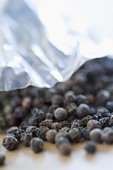
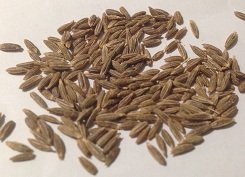

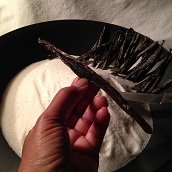
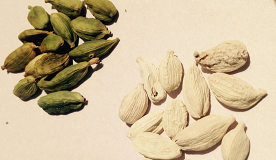
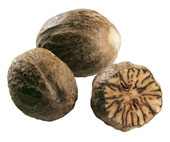
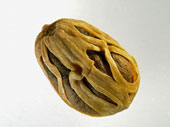
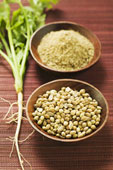
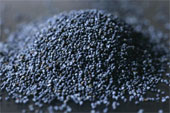
New! Comments
Have something to say about what you just read? Leave me a comment in the box below.